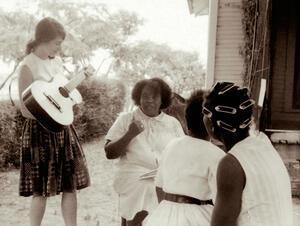Dayenu. Dayenu. Dayenu.
This past year, I took a group of seven teens on a tour of the American South. The trip was inspired by my desire to infuse young people with a sense of history and context as it relates to Judaism in the South and Jews in the Civil Rights Movement.
We began in Atlanta, then drove to Alabama, stopping in Birmingham, Montgomery, Selma, and many places in between. We met with people who had lived through segregation and fought against it. We saw the Rosa Parks Museum, experienced history, and talked about what it means to be an American Jew from the Northeast.
Prozdor at Hebrew College in Newton, Massachusetts provides these kinds of experiences for teens from Southern New England, and this was one of the most moving and relevant trips I've ever taken as an educator. I was privileged to be with this group during moments of struggle, connection, and growth.
The voices of my JOIN cohort rang in my head while we traveled, challenging me to address tension and discomfort head on. The other fellows reminded me to push with gentle force, to challenge my own assumptions and, in turn, those of my teens. As the days progressed, I found myself pushing my students, asking them questions about their preconceived notions of the world, which to this point, had been sheltered in some of the wealthy suburbs of Boston.
But during our Shabbat discussion, while sitting on the floor of a hotel room in Birmingham, Alabama, I learned the true meaning of the word dayenu.
Dayenu, from our Passover liturgy, means “it would have been enough.” Throughout our trip, I yearned for the teens’ exploration of Civil Rights history to open up a conversation about race, class, and privilege in America. And I was particularly eager to hear about where they felt they fit into the story.
Sitting on the floor with seven high school juniors, we found ourselves in the midst of intense discussion about power in the contemporary Jewish community and how we might relate to the larger US community. I learned what it means to feel like the world has given you so much that you can’t really stand it anymore.
Just getting to take the trip, dayenu.
The experience we had, dayenu.
When a student began to compare oppression of Jews in Europe and that of African Americans in the United States, I interjected, and challenged the group to stop drawing this parallel line that I hear too often in Jewish communities. “Too often we get in the business of comparing who had it worse,” I said. “It’s probably not productive, and it is most certainly not a fair equation.”
The conversation that followed on that hotel floor would have been enough. An exploration of our shared histories, tears of discomfort and fear, some angry words, some calming ones, and inevitably more questions than answers. The sheltering walls that had kept these suburban teens from fully grasping the world around them started to crumble and fall.
Dayenu.
The floor of that hotel room in Birmingham reminded me that I believe in the power of teenagers. And I believe that the most fundamental of organizing principles we learn in JOIN–holding tension and creating agitation–are central to my work helping them grow into leaders who will change the world.
And again all I can say is Dayenu. Dayenu. Dayenu. This is more than enough.







Thanks for your post Emilia. It is great to think about in light of upcoming 50th anniversary of March on Washington.